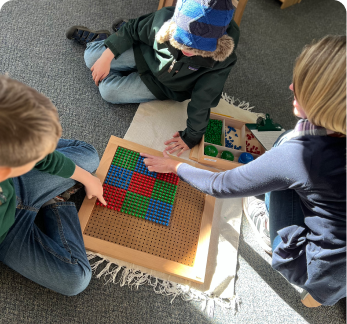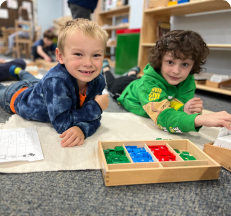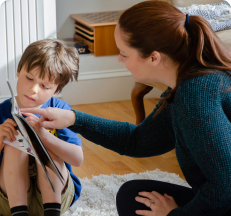Elementary
at Sandwich
The Montessori preschool that supports the social, emotional, cognitive, and physical development of the child.
Now Enrolling for 2024-25
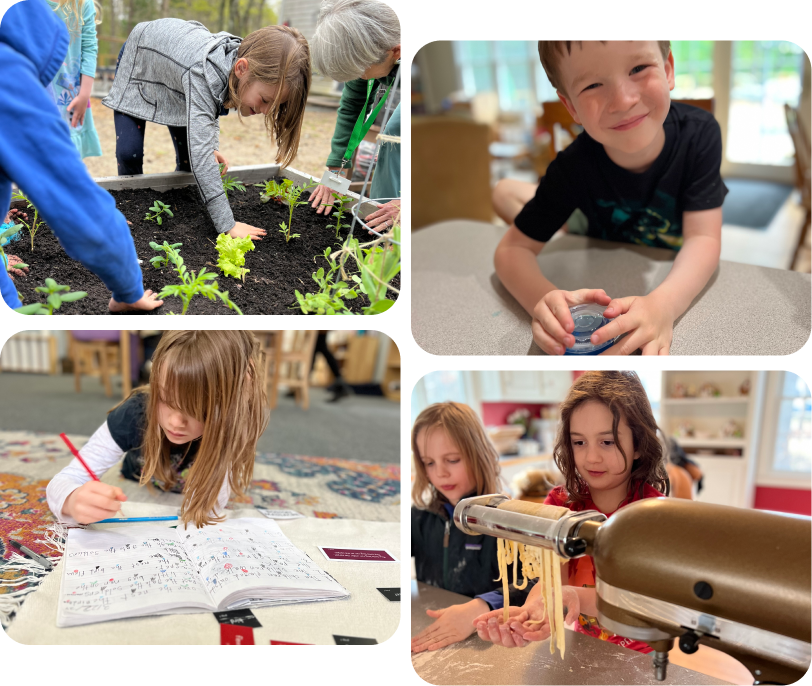
Explore the Program
Visit the campus or request more information
Hybrid Homeschool Program
In addition to our full-time Elementary program, Sandwich Montessori School offers a Hybrid Homeschool Program designed for families seeking a blend of structured classroom learning and home-based education. This program provides flexibility while ensuring students receive a comprehensive Montessori education. For more information and to discuss how this program can meet your family's needs, please contact our admissions office.
Elementary for Ages 6-12
The Elementary program at this small, community-centered Montessori school serves children aged 6–12, emphasizing leadership, mastery, and active engagement. Students take accountability for their learning, care for their environment, and mentor peers, fostering responsibility and confidence.
Combining Montessori philosophy with Classical education, the program offers an enriching experience led by highly trained teachers. Students engage with thoughtfully prepared materials and Classical texts, promoting mastery and intellectual growth inspired by the learning paths of history’s great leaders.
The program also emphasizes community involvement, encouraging students to contribute meaningfully to their neighborhood and uphold values of public virtue. Through inquiry and discussion, students are guided to ask questions, embrace challenges, and critically examine their beliefs, developing the skills and character needed to thrive both academically and personally.
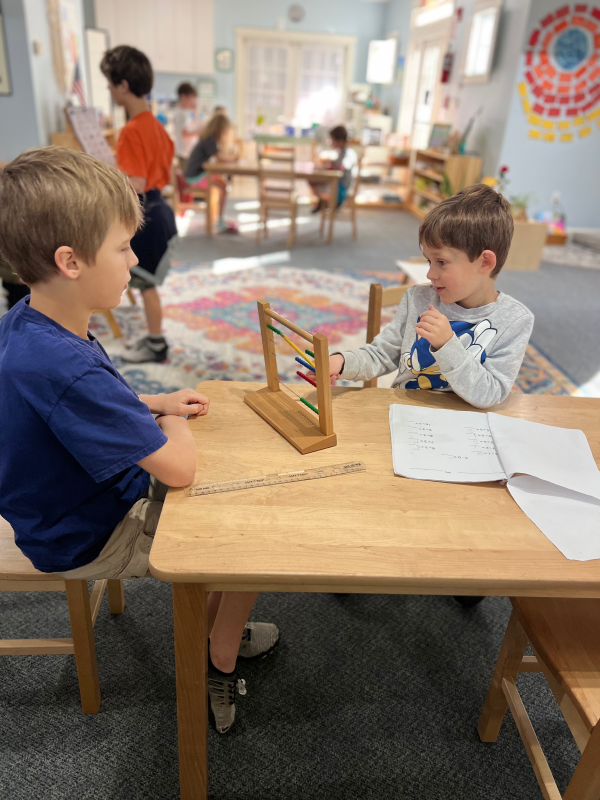
Elementary Curriculum
Practical Life
Practical Life activities help children develop independence and confidence by connecting real-world skills to social and academic challenges. These activities promote self-reliance and personal responsibility, emphasizing practical skills for interacting with the community and the broader world.
Astronomy
Explores the universe's beginning, fundamental forces, and the formation of planets and Earth. Students learn about Earth’s systems, weather, ocean life, and the relationship between the Earth, sun, and moon.
Botany
Exploration of root systems and their functions, identification of common flowers, trees, and shrubs, and classification of different types of roots, fruits, and seeds. Students learn to classify plants and understand their structures and functions.
Geology
Covers the layers of the Earth, rock and water cycles, space, and the solar system. Students study basic chemical reactions, human body systems, and functions. Introduction to scientific methods and inquiry is included.
Geometry
Students learn the nomenclature of shapes, create patterns, and explore the relationships between two- and three-dimensional figures. They study types and measurements of angles, shape attributes, and size. Practical applications include measuring area and
perimeter of quadrilaterals, and exploring concepts of symmetry, congruency, and scale.
Grammar
Students identify and understand the nine main parts of speech and their functions, follow singular and plural rules for grammar and spelling, and classify nouns by qualities such as common, proper, singular, plural, concrete, abstract, and collective. They learn to identify positive, comparative, and superlative adjectives, conjugate verbs in past, present, and future tenses, and analyze sentences by identifying the subject, predicate, and direct object.
Geography
Teaches the shape of the Earth, continents, oceans, and cardinal directions. Students develop map skills, understand biomes, political and economic geography, and locate natural resources. They also study U.S. states and capitals and enhance their spatial awareness.
History
Focuses on the passage of time, including the calendar, seasons, and historical timelines. Students learn about ancient civilizations, fundamental needs of humans, significant world events, and U.S. history from colonization through modern times.
Language
Language instruction builds effective communication skills, focusing on phonological awareness, reading comprehension, and writing. Children enhance their ability to express themselves clearly, understand grammar, and engage with various literary genres, with an emphasis on reading and writing fluency.
Nature
Students begin to ask questions about organisms and conduct research. They identify vertebrates and invertebrates, understand plant and animal processes, growth, life cycles, and basic nomenclature. They explore plate tectonics, geographical features, properties of matter, and fundamental physical principles like gravity and magnetism.
Math
Mathematics education covers foundational concepts like number recognition, place value, and basic operations, advancing to complex topics such as geometry, fractions, and problem-solving. Students apply mathematical concepts to real-world situations, developing skills in graphing, probability, and measurement.
Fine Arts
Art education encourages experimentation with various techniques and materials, fostering creativity and artistic expression. Students explore different art styles and historical contexts, applying artistic principles and vocabulary while creating their own compositions and connecting their work to cultural and historical themes.
Zoology
Focuses on animal routines, sounds, and advanced classification. Students learn about the basic needs, adaptations, and life cycles of animals, integrating this knowledge with practical life experiences to understand various animal characteristics.
Sciences
Science education explores life and physical sciences, including botany, zoology, and earth sciences. Students investigate ecosystems, geological processes, and the human body through research, experiments, and hands-on activities, applying the scientific method and understanding environmental interactions.
Elementary Faculty, 6-12 Program

Shannon Paull
Teaching Partner

Shannon Paull
Teaching Partner

Shannon Paull
Teaching Partner
Recent Stories from Sandwich
The Guiding Principles At Sandwich Montessori
We guide children to be kinder, braver, and stronger, equipping them with empathy and courage to make a difference in the world.
We empower kids to lead by example, take responsibility, and support their peers, building leadership skills that start in the classroom.
Our students learn the value of teamwork and respect, understanding how their actions can positively impact their community.
At SMS, we encourage children to explore their passions through hands-on learning, fostering a love for knowledge that goes beyond the classroom.
We nurture curiosity by encouraging kids to ask questions, think critically, and engage in meaningful conversations.
We blend classical education with Montessori principles, inspiring children to think deeply and connect with the world through timeless ideas.
Nature is central to learning at SMS. We integrate outdoor experiences to help children connect with and learn from the natural world.
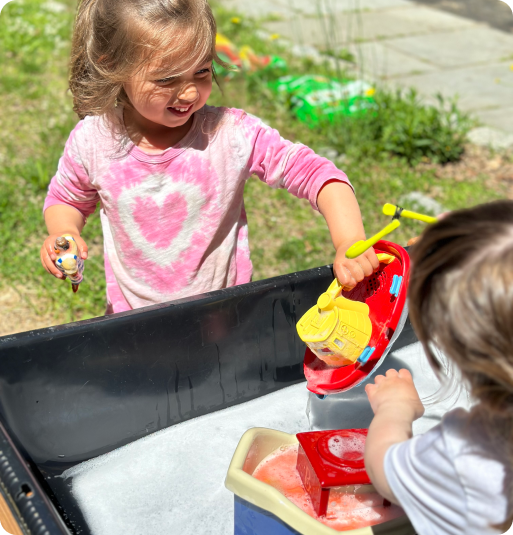
Let’s Stay Connected!
You'll receive our quarterly newsletters and get a glimpse into our beautiful and growing school.
By submitting this form, you are consenting to receive marketing emails from: Sandwich Montessori School.
Support
Contacts us
- mmcjunkin@earlyeducationinc.com
- (508) 468-0799
- 284 Cotuit Road
Sandwich, MA 02563
Copyright © 2024 Sandwich Montessori

